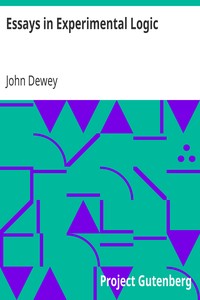Essays in Experimental Logic by John Dewey
"Essays in Experimental Logic" by John Dewey is a philosophical work written in the early 20th century. The text delves into the intricacies of logic and thought, attempting to bridge the gap between intellectual processes and the experiences that inform them. At its core, the book argues for an understanding of knowledge as an experiential and experimental endeavor, underscoring how reflection and inquiry play essential roles in shaping human understanding. The opening
of the essays presents an introduction to Dewey's foundational ideas. He emphasizes the relationship between experience and knowledge, positing that knowledge arises from reflection upon a prior, non-reflective stage of experience that is rich in social and contextual elements. Dewey argues that thinking should not be viewed as an isolated mental activity but rather as an integral part of our active engagements with the world. Moreover, he seeks to clarify misconceptions surrounding the relationship between thought and the objects of knowledge, insisting on the importance of grounding philosophical discussions within real-world experiences. This sets the stage for later essays that further explore the dynamics of logic and inquiry in shaping both individual understanding and collective knowledge. (This is an automatically generated summary.)
Read or download for free
| How to read | Url | Size | |||
|---|---|---|---|---|---|
| Read now! | https://www.gutenberg.org/ebooks/40794.html.images | 753 kB | |||
| EPUB3 (E-readers incl. Send-to-Kindle) | https://www.gutenberg.org/ebooks/40794.epub3.images | 349 kB | |||
| EPUB (older E-readers) | https://www.gutenberg.org/ebooks/40794.epub.images | 354 kB | |||
| EPUB (no images, older E-readers) | https://www.gutenberg.org/ebooks/40794.epub.noimages | 336 kB | |||
| Kindle | https://www.gutenberg.org/ebooks/40794.kf8.images | 650 kB | |||
| older Kindles | https://www.gutenberg.org/ebooks/40794.kindle.images | 593 kB | |||
| Plain Text UTF-8 | https://www.gutenberg.org/ebooks/40794.txt.utf-8 | 679 kB | |||
| Download HTML (zip) | https://www.gutenberg.org/cache/epub/40794/pg40794-h.zip | 326 kB | |||
| There may be more files related to this item. | |||||
Similar Books
About this eBook
| Author | Dewey, John, 1859-1952 |
|---|---|
| Title | Essays in Experimental Logic |
| Contents | The relationship of thought and its subject-matter -- The antecedents and stimuli of thinking -- Data and meanings -- The objects of thought -- Some stages of logical thought -- The logical character of ideas -- The control of ideas by facts -- Naïve realism vs. presentative realism -- Epistemological realism: the alleged ubiquity of the knowledge relation -- The existence of the world as a logical problem -- What pragmatism means by practical -- An added note as to the "practical" -- The logic of judgments of practice. |
| Credits |
Produced by Barbara Tozier, Bill Tozier, JoAnn Greenwood, and the Online Distributed Proofreading Team at http://www.pgdp.net |
| Reading Level | Reading ease score: 45.8 (College-level). Difficult to read. |
| Language | English |
| LoC Class | BC: Philosophy, Psychology, Religion: Logic |
| Subject | Logic |
| Subject | Thought and thinking |
| Subject | Realism |
| Category | Text |
| EBook-No. | 40794 |
| Release Date | Sep 19, 2012 |
| Copyright Status | Public domain in the USA. |
| Downloads | 373 downloads in the last 30 days. |
| Project Gutenberg eBooks are always free! | |

